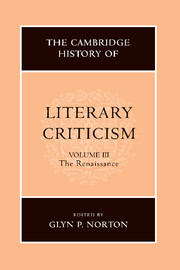Book contents
- Frontmatter
- Introduction
- READING AND INTERPRETATION: AN EMERGING DISCOURSE OF POETICS
- POETICS
- I Humanist classifications
- II The rediscovery and transmission of materials
- 9 Literary imitation in the sixteenth century: writers and readers, Latin and French
- 10 Petrarchan poetics
- 11 Translatio and translation in the Renaissance: from Italy to France
- 12 Invention
- III Rhetorical poetics
- IV Literary forms
- THEORIES OF PROSE FICTION
- CONTEXTS OF CRITICISM: METROPOLITAN CULTURE AND SOCIO-LITERARY ENVIRONMENTS
- VOICES OF DISSENT
- STRUCTURES OF THOUGHT
- NEOCLASSICAL ISSUES: BEAUTY, JUDGEMENT, PERSUASION, POLEMICS
- A SURVEY OF NATIONAL DEVELOPMENTS
- Bibliography
- Index
- References
10 - Petrarchan poetics
from II - The rediscovery and transmission of materials
Published online by Cambridge University Press: 28 March 2008
- Frontmatter
- Introduction
- READING AND INTERPRETATION: AN EMERGING DISCOURSE OF POETICS
- POETICS
- I Humanist classifications
- II The rediscovery and transmission of materials
- 9 Literary imitation in the sixteenth century: writers and readers, Latin and French
- 10 Petrarchan poetics
- 11 Translatio and translation in the Renaissance: from Italy to France
- 12 Invention
- III Rhetorical poetics
- IV Literary forms
- THEORIES OF PROSE FICTION
- CONTEXTS OF CRITICISM: METROPOLITAN CULTURE AND SOCIO-LITERARY ENVIRONMENTS
- VOICES OF DISSENT
- STRUCTURES OF THOUGHT
- NEOCLASSICAL ISSUES: BEAUTY, JUDGEMENT, PERSUASION, POLEMICS
- A SURVEY OF NATIONAL DEVELOPMENTS
- Bibliography
- Index
- References
Summary
Credit for canonizing Petrarch's fourteenth-century Rime sparse usually goes to Pietro Bembo's Prose della volgar lingua (1525). Squeezing out of Petrarch's 200-year-old Siculo-Tuscan literary idiom the seeds of a factitious cultural heritage, Bembo promoted a style that spoke oddly to Italy's competing regional centres, much less to the emerging national literatures of monarchies outside of Italy. Yet Petrarchism became the dominant lyric style not only in Italy but throughout Europe. Divergent critical views of Petrarch inscribed in fifteenth- and sixteenth-century commentaries on the Rime sparse and Trionfi offer compelling evidence. They construct a narrative of multiple Petrarchs, heterogeneous versions of the Rime e trionfi conformable to opposing ideologies at different times and in different places. In their light we may better understand Petrarch's place in a divided Italy, an imperial Spain, a monarchical France, and Protestant England.
The earliest Florentine biographies of Petrarch by Filippo Villani (1381), Pier Paolo Vergerio (1397), Leonardo Bruni (1436), and Giannozzo Manetti (1440s) reclaimed Petrarch's Florentine ancestry and depicted him as sympathetic to the republican spirit of civic humanism, but they offered few comments on his vernacular poetry. Commentaries written under the auspices of despotic rulers in northern Italy a century later, however, read and interpreted the Italian verse on different horizons. Each supports claims sympathetic to the aristocratic, autocratic, and expansionist interests of Ghibelline monarchism or Venetian oligarchy, and each asserts a special relationship with the historical Petrarch who spent the longest period of his Italian residence in northern territories, first at Milan where he served the Visconti (1353–61); then at Venice (1362–7); and finally in Padua and Arquà (1368–74) where Francesco da Carrara granted him an estate.
- Type
- Chapter
- Information
- The Cambridge History of Literary Criticism , pp. 119 - 126Publisher: Cambridge University PressPrint publication year: 1999
References
- 2
- Cited by



